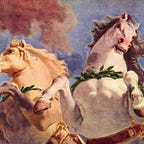- Works of art are the result of an immeasurably complex evolution of forces; works of art emerge from a civilization through an individual. Art is the fructification of a people.
- Modernist literature was produced under the assumption that literature was of critical importance to civilization. The great experiments — the massive investments of time made by a Joyce or a Proust; a Woolf or a Faulkner— of modernist literature, were justified by the relative impact that literature could have on consciousness. To write was to be heard, or potentially heard. Aesthetics was an alternate to politics. Modernism stepped into the void of values made by the Great War — assuming that it could create new values. Literature now (I can’t help but feel) isn’t up to the task. It’s not just a matter of cognitive competition from smartphones — it’s a matter of deep apathy and indifference. The American novel is relentlessly, blithely middlebrow.
- There is contemporary literature that easily stands with the work of the last century — I’ve just not read any written by an American.
- Entertainment cannot respond to the Age of Trump, it can only amplify. Trump himself is an entertainer. Logically, then, literature — if it is to survive at all — has to do something more than entertain. It has to challenge, but it has to challenge specifically by finding a new form relative and relevant to the ironies of the present.
- The written word is undergoing a radical challenge to its own place in human cognition.
- A texting culture is not a writing culture.
- The next decade or so will be interesting: it will tell us if there will ever American literature — American artists in general — will be able to seriously respond to the crisis of their own unseriousness.
- Can we find a wisdom that can compensate for the wisdom we’ve lost?
